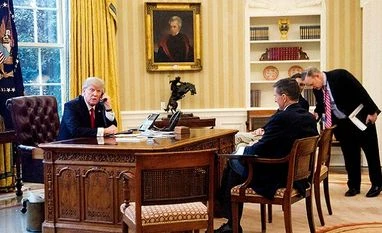Major US stock indexes posted their largest drop so far in 2017 on Monday as investors worried that a curb on immigration ordered by Donald Trump was a reminder that some of the US president's policies are not market-friendly.
An executive order issued by Trump on Friday banned immigration from seven Muslim-majority countries, including legal residents and visa holders, and temporarily halted the entry of refugees. Over the weekend, thousands of people rallied in major US cities and at airports in protest.
US equities had hit a series of record highs following Trump's election in November, encouraged by his promise of tax cuts and simpler regulations.
"Investors focused on the pro-growth of (Trump's) proposals and not those detrimental to economic activity, like protectionism," said Peter Cardillo, chief market economist at First Standard Financial in New York.
He said investors wore blinders to only see the market-friendly policies Trump spoke about during the campaign and the immigration ban was a reminder of actions he could take that could undermine the economy.
Technology, a sector which has openly opposed bans on immigration and hurdles to hiring foreign talent, weighed the most on the S&P 500.
More From This Section
The Dow Jones Industrial Average fell 122.65 points, or 0.61 per cent, to close at 19,971.13, the S&P 500 lost 13.79 points, or 0.60 per cent, to 2,280.9 and the Nasdaq Composite dropped 47.07 points, or 0.83 per cent, to 5,613.71.
It was the largest daily per centage drop for the Dow since October, while the S&P and Nasdaq dropped the most since late December.
Earlier, Trump signed an executive order that would seek to pare back federal regulations by requiring agencies to cut two existing regulations for every new rule introduced.
In an event with small business leaders, Trump took credit for the market rally since November 8.
"The stock market has gone up massively since the election. Everyone's saying 'Oh, the market will go down.' I said 'The market's not going down'."
The Russell 2000 index of small and mid-cap companies fell 1.3 per cent Monday, giving back all of January's gains.
The CBOE Volatility index or Wall Street's "fear gauge" rose 1.30 points, the most for any day since November 3.
Stocks fell even as US consumer spending accelerated and a measure of pending home sales rose in December, pointing to sustained domestic demand that could spur economic growth in early 2017.
"Non-economic factors are starting to enter the fray to the detriment of the positive story equity market participants have been anticipating," said Washington, DC-based Wayne Wicker, chief investment officer at retirement plan manager firm ICMA-RC, which says holds about $36 billion in assets under management.
Airline stocks fell, with American Airlines down 4.4 per cent and United Continental down 3.6 per cent. At least one analyst cited worries over the travel ban to the United States.
"The concern is that (Trump's) travel ban starts to encompass more countries or that there are more stringent restrictions on travel to the US," or other countries retaliate, said Stifel analyst Joseph DeNardi.
Delta , which suffered a systems outage that grounded about 280 flights between Sunday and Monday, fell 4.1 per cent.
Also in investors' crosshairs: a Federal Reserve's policy meeting that begins Tuesday, corporate earnings from key companies such as Apple and Facebook and a raft of economic data including Friday's jobs report.
The S&P 500 posted five new 52-week highs and five new lows; the Nasdaq Composite recorded 49 new highs and 42 new lows.
About 6.67 billion shares changed hands in US exchanges, just above the 6.65 billion daily average over the last 20 sessions.
)